Lab grown meat companies are shaping the future of food, and London is quickly becoming a key player in this global movement. As sustainability becomes a critical concern and the demand for ethical meat alternatives grows, a wave of innovative startups and biotech firms in the UK capital are working to produce meat without the need for animal slaughter.
These companies are combining science, sustainability, and technology to redefine how we consume protein and London is at the forefront.
Why Is London Emerging as a Leader in Lab Grown Meat Innovation?

London’s rise as a hub for lab grown meat companies can be attributed to a unique combination of factors: strong academic research, supportive government policies, venture capital interest, and a population that is increasingly concerned with ethical and sustainable food consumption.
The city is home to top-tier universities conducting advanced research in biotechnology and food science. These institutions have become the breeding ground for many of the food tech startups now creating lab grown meat in controlled, sterile environments.
London’s multicultural population also fosters demand for diverse, sustainable dietary choices, encouraging innovation across alternative protein sectors.
What Are the Environmental and Ethical Advantages of Lab Grown Meat?

Cultured meat production offers a significant reduction in environmental impact compared to traditional meat farming. Conventional meat production is resource-intensive requiring vast amounts of land, water, and feed, and contributing heavily to greenhouse gas emissions. In contrast, lab grown meat uses up to 96% less water and 99% less land while emitting fewer pollutants.
From an ethical standpoint, lab grown meat eliminates the need to raise and slaughter animals. This addresses concerns about animal welfare while maintaining the same biological composition and nutritional value as meat derived from livestock. For many Londoners seeking cruelty-free and sustainable protein sources, lab grown meat presents a viable and compelling option.
How Do Lab Grown Meat Companies Create Real Meat Without Animals?

Lab grown meat, also known as cultured or cell-based meat, is made by harvesting a small sample of animal cells, typically muscle or fat tissue. These cells are then placed in a nutrient-rich environment, allowing them to grow and multiply in bioreactors, much like fermentation tanks used in brewing beer.
Using cellular agriculture techniques, the cells form muscle tissue the same as conventional meat but without the need for a living animal. The end result is meat that looks, cooks, and tastes just like the real thing, but with far fewer ethical and environmental compromises.
Which Are the Top 10 Lab Grown Meat Companies in London?
1. Mosa Meat – “From Lab Burger to Supermarket Staple”

Mosa Meat, the Dutch company behind the world’s first cultivated beef burger, has become one of the most prominent names in the clean meat space. The company is refining its technology to bring affordable, high-quality beef mince to the mainstream, targeting burgers, meatballs, and everyday favourites.
Its focus lies in cost-down innovations across media formulation and production scale-up. Though based in the Netherlands, Mosa Meat is actively engaging the UK market, including London foodservice and retail partnerships. The company’s product development is backed by major global investors and is tailored for wide consumer adoption.
Focus Area
Reliable production of cultivated beef for everyday meals.
Ideal For
Fast-food chains and grocery retailers pushing sustainability.
Pricing: Currently pre-market; B2B and pilot-phase engagements.
- Website: mosameat.com
- Email: ontact form
Review: ★★★★☆ “Juicy, grillable, and behaves like regular mince super promising.”
2. Aleph Farms – “Steaks, Reimagined with Cell Precision”

Aleph Farms is a cultivated meat company focused on structured beef cuts, specifically steaks, using tissue engineering to develop authentic marbling, chew, and sear. With its headquarters in Israel and partnerships expanding across Europe and the UK, Aleph Farms is tailoring its offering for premium food experiences.
The company collaborates with chefs to refine textures and taste, ensuring the product delivers a full sensory experience. Their supply chain planning includes regional hubs and sustainability-driven collaborations in cities like London.
Core Innovation
Structured cultivated steaks with full muscle and texture.
Perfect For
Fine dining concepts and chef-led food tech partnerships.
Pricing: Limited to pilots and tasting events.
- Website: aleph-farms.com
- Email: Contact Form
Review: ★★★★☆ “A beautiful sear and bite indistinguishable in a blind tasting.”
3. Eat Just (GOOD Meat) – “Chicken Without the Cage”
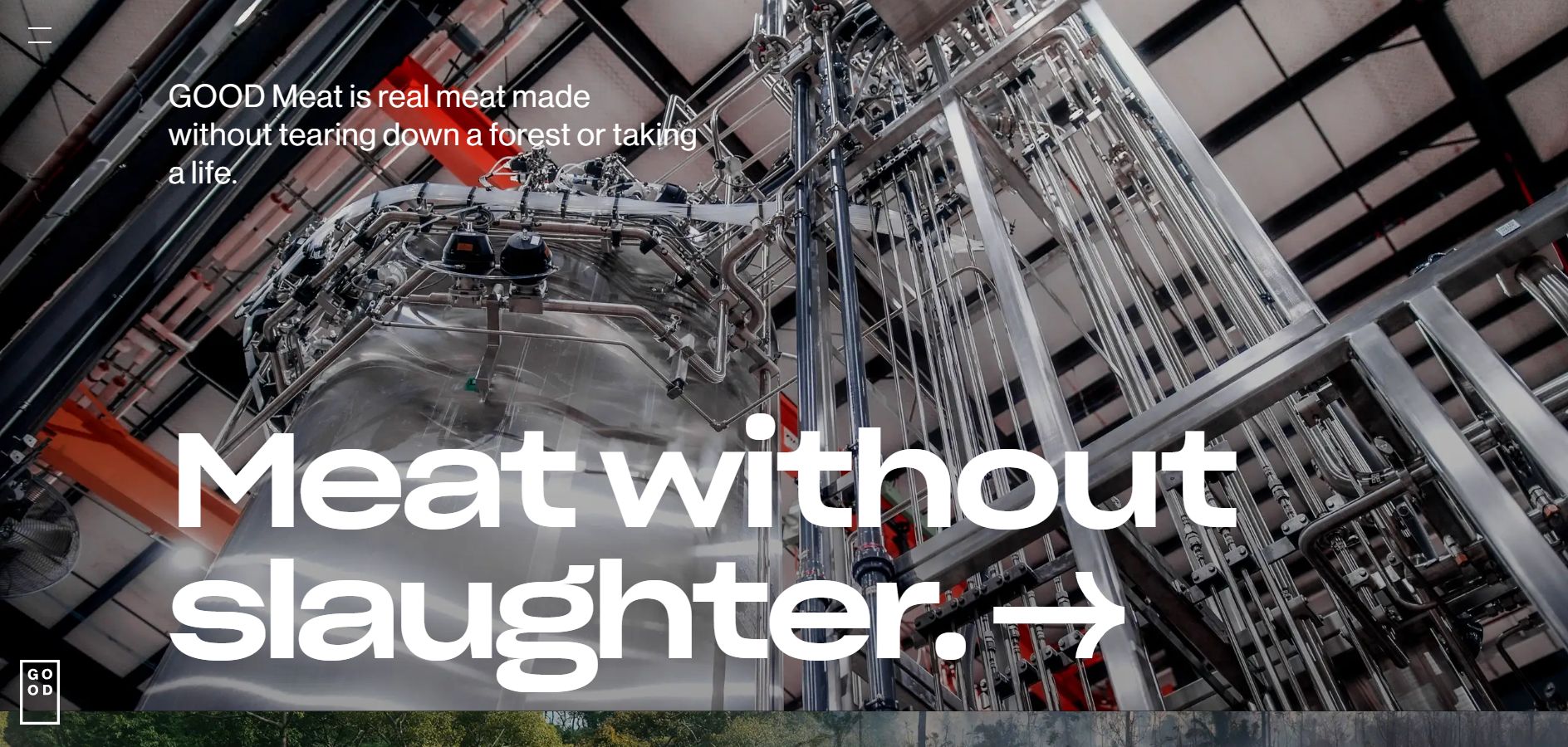
GOOD Meat, a division of US-based Eat Just, has made headlines with its cultivated chicken, approved in Singapore and served at tastings globally. The company is now eyeing the UK market with tastings, food events, and chef partnerships in London.
GOOD Meat focuses on familiar chicken formats like strips, bites, and fillets providing an accessible entry point for cultivated meat. Their tech is built around large-scale bioreactors and a commitment to clean-label, ethical sourcing.
Special Capability
Cell-based chicken formats that feel familiar and cook like the real deal.
Best Choice For
Restaurants wanting to trial sustainable meat with mass appeal.
Pricing: Partner-based tasting programs and pre-market agreements.
- Website: goodmeat.co
- Address: London outreach; HQ in California, USA
- Email: wecare@goodmeat.co
Review: ★★★★☆ “Surprisingly tender and neutral perfect for classic chicken dishes.”
4. Upside Foods – “Cultivated Meat with Range and Reach”

Upside Foods, based in the US, is developing cultivated chicken, beef, and duck offering one of the most diverse product pipelines in the industry. Their large-scale production facility, known as EPIC, sets them apart in terms of manufacturing readiness.
Though based in California, they’re exploring expansion and partnerships across Europe, including UK food tech clusters. With products designed for both home and restaurant use, Upside Foods is aiming for broad market penetration in the near future.
Primary Focus
Multispecies cultivated meats designed for global scalability.
Most Relevant For
Retail and foodservice providers seeking range and production-ready formats.
Pricing: In development; large-scale partnerships under review.
- Website: upsidefoods.com
- Email: hello@upsidefoods.com
Review: ★★★★☆ “Duck was the standout rich, clean, and surprisingly tender.”
5. Believer Meats – “Scaling the Science of Cultivated Protein”
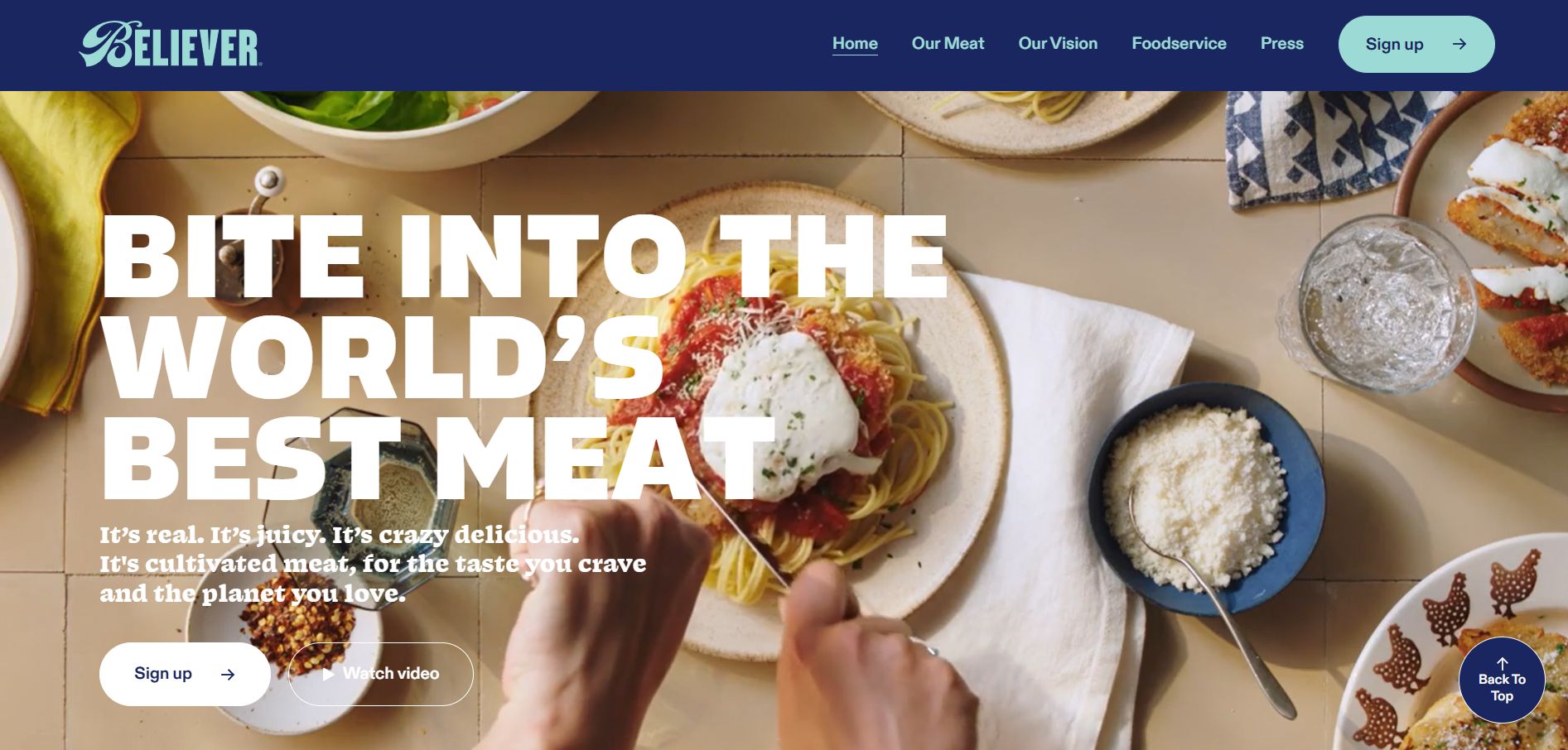
Formerly known as Future Meat, Believer Meats is taking a high-efficiency approach to cultivated chicken, lamb, and beef. Their strength lies in reducing production costs and increasing bioreactor output, bringing cultivated meat closer to price parity with traditional meat.
Believer Meats is building one of the world’s largest cultivated meat facilities and is poised to supply large food chains. Their engagement with European regulators and commercial partners is growing, making London a likely strategic partner city in the near future.
Unique Offering
High-volume, cost-effective cultivated meat across key proteins.
Ideal Scenario
Food brands targeting affordability, scale, and supply chain readiness.
Pricing: Partner-based commercial scaling and trials.
- Website: believermeats.com
- Email: generalinquiries@believermeats.com
Review: ★★★★☆ “Impressive control on cost and scale a real game-changer for mass markets.”
6. Gourmey – “French Flair Meets Cultivated Innovation”

Paris-based Gourmey brings a refined approach to cultivated meat, focusing on delicacies like foie gras alongside duck and chicken. Their tissue engineering expertise allows them to replicate the soft textures and rich flavours associated with gourmet cuisine.
The company is also participating in tastings and sustainability forums across Europe, including culinary collaborations with UK-based chefs. Gourmey’s goal is to bring culinary artistry to the cultivated space, using technology to preserve tradition while eliminating animal harm.
Distinguishing Trait
Luxury-grade cultivated meats inspired by French culinary heritage.
Best Application
High-end food brands elevating menu items with ethical sourcing.
Pricing: Currently at pilot and testing stage.
- Website: gourmey.com
- Email: Contact form
Review: ★★★★☆ “The foie gras was astonishing flavourful and smooth, no compromise.”
7. Meatable – “Fast-Tracking Cultivated Pork”

Meatable is rapidly gaining recognition for its cultivated pork products, especially sausages and whole cuts. Based in the Netherlands, the company uses opti-ox technology to accelerate cell growth and differentiation without genetic modification.
Meatable has shared a strong interest in UK partnerships, particularly with London’s food innovators and alt-protein groups. Their cultivated pork is being developed for commercial tastings and consumer testing, with a long-term goal of supermarket availability.
Technological Edge
Rapid, scalable pork production without genetic modification.
Tailored For
Retailers and manufacturers preparing for pork product innovation.
Pricing: In pilot stage; collaboration-dependent.
- Website: meatable.com
- Email: information@meatable.com
Review: ★★★★☆ “Their sausage texture is remarkably lifelike savoury, satisfying, and grill-ready.”
8. Future Meat Technologies – “Pioneering Efficiency in Cultivated Production”

Future Meat Technologies (acquired and rebranded as Believer Meats) built its reputation on achieving efficient, high-yield cultivated meat at lower costs. Their breakthrough came from recycling media in bioreactors and maintaining fast cell growth cycles.
This has made them one of the most watched companies in the cultivated sector. The company is engaged with UK stakeholders as part of its global scaling plan, bringing chicken, lamb, and beef to wider markets.
Noteworthy Focus
Ultra-efficient cultivated meat production at scale.
Most Suitable For
Large buyers focused on cost, logistics, and food system resilience.
Pricing: Dependent on partnership size and production volume.
- Website: future-meat.com
- Phone: +44 (0)1273 789989
- Address: Israel HQ; London partnership potential
- Email: info@rethinkevents.com
Review: ★★★★☆ “Their ability to scale with consistency is truly unmatched.”
9. Cellular Agriculture Ltd – “The UK’s Cultivated Meat Research Engine”
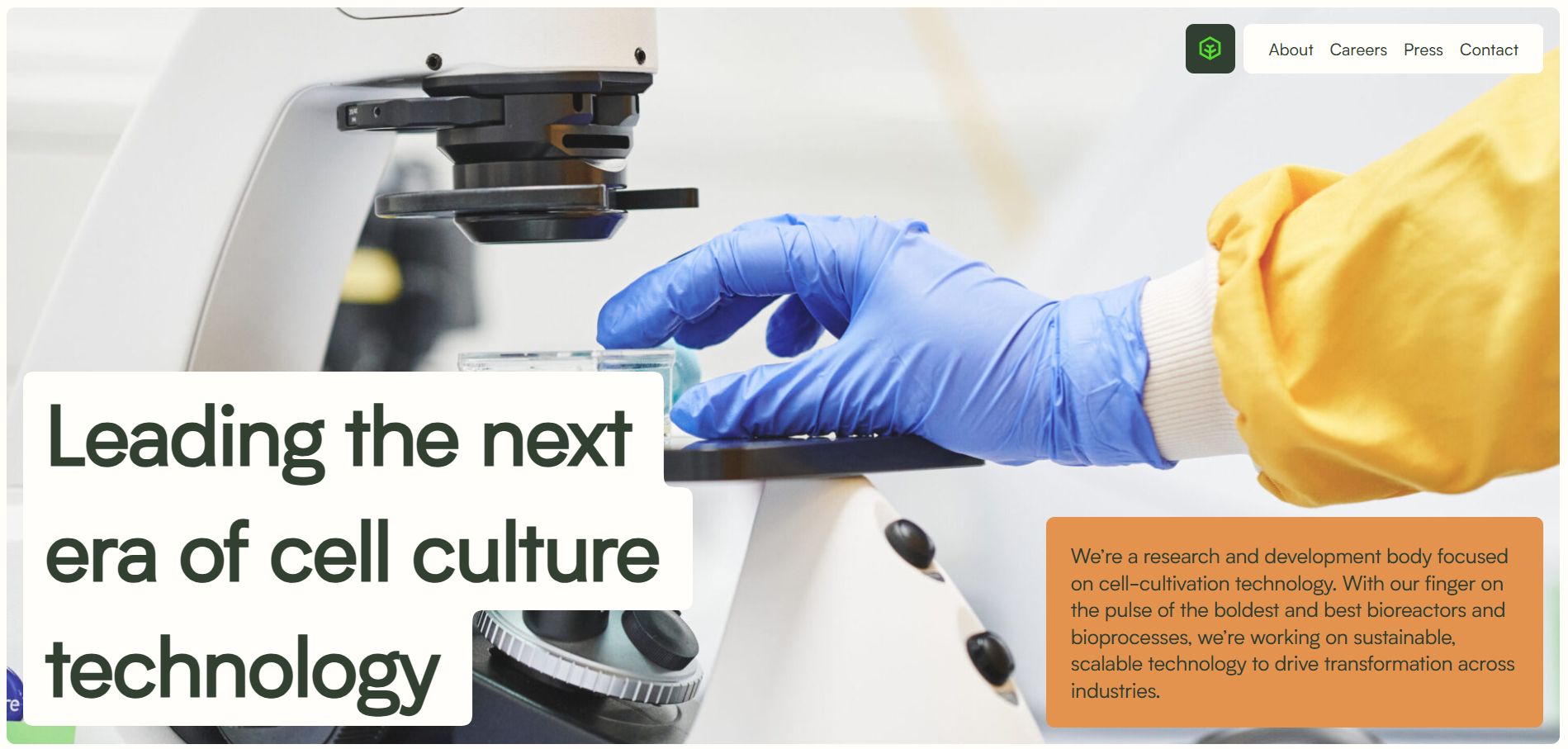
Cellular Agriculture Ltd is one of the few UK-based cultivated meat R&D firms, focusing on research and development rather than product launches. The company supports startups by providing bioprocessing knowledge, regulatory guidance, and scientific consulting.
They are well-positioned in the London innovation ecosystem, collaborating with universities, government bodies, and ethical investment groups. Though not a commercial meat brand, their contributions are critical to the ecosystem’s success.
Core Role
Back-end science and support for the cultivated meat supply chain.
Well-Matched For
Startups seeking foundational research, guidance, and UK regulatory support.
Pricing: Project-based and consulting-specific.
- Website: cellularagriculture.co.uk
- Phone: Available on website
- Address: London, UK
- Email: Available on website
Review: ★★★★☆ “A vital knowledge partner they filled critical R&D gaps in our early stage.”
10. Multus – “Powering Cultivated Meat with Smart Growth Media”
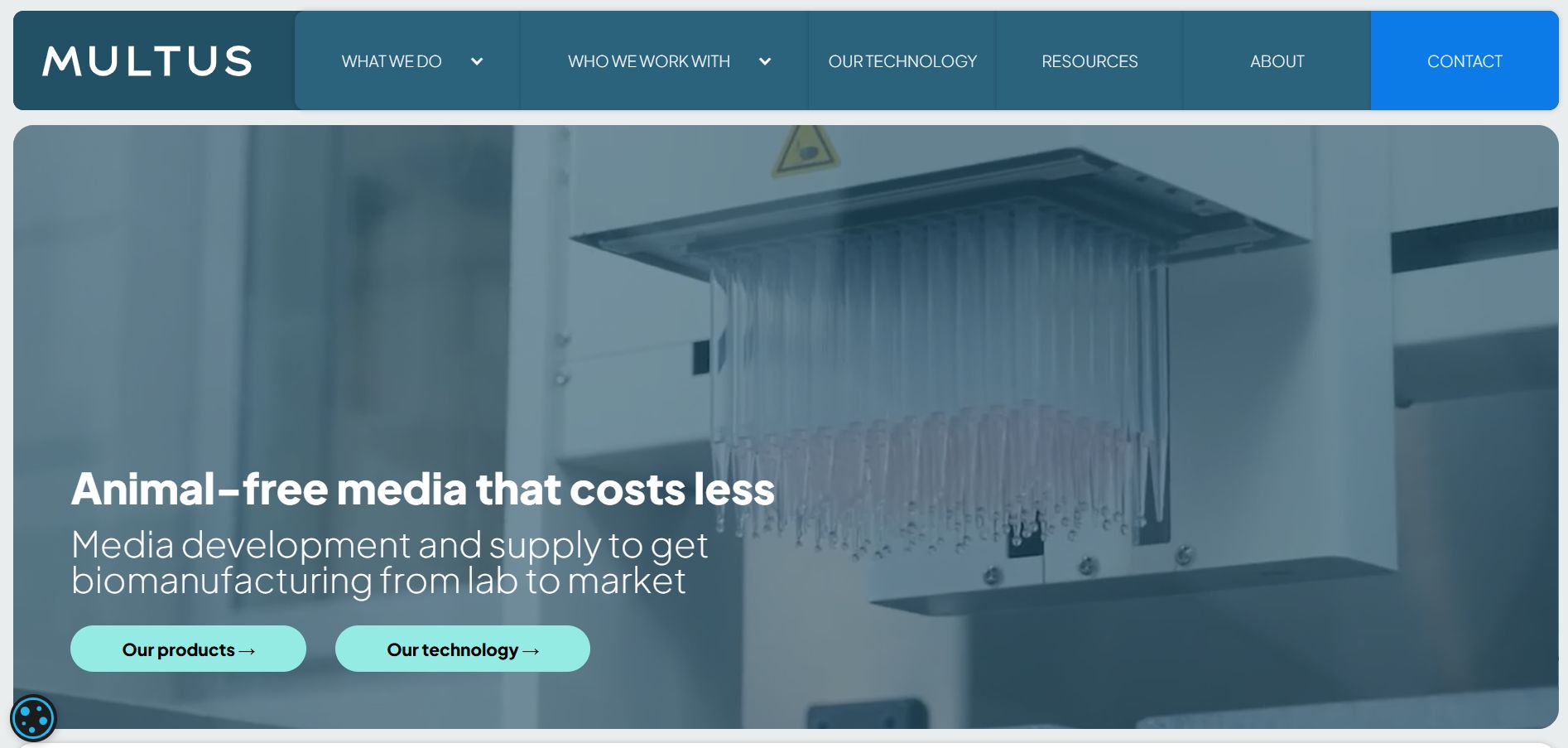
Multus, based in London, is an essential behind-the-scenes enabler in the lab grown meat industry. Instead of producing meat, they develop the growth media that lab grown meat companies rely on to cultivate cells efficiently and affordably. Traditional cell culture relies heavily on fetal bovine serum (FBS), which is expensive, inconsistent, and not animal-free.
Multus addresses this with fully serum-free, animal-free formulations designed for high performance across various species and cell types. Their flagship products reduce production costs, improve yield consistency, and are helping cultivated meat companies transition from lab to pilot-scale production.
Multus partners with startups and established players across the UK, EU, and beyond making them a key piece of the cell-based meat puzzle. With cutting-edge R&D, a mission for sustainability, and local operations in the heart of London, they’re pushing the industry toward a commercially viable future.
Area of Expertise
Serum-free growth media engineered for affordability and cell health.
Ideal Collaborators
Lab grown meat startups and scale-ups looking to reduce media costs and increase reliability.
Pricing: Custom enterprise pricing based on product volume and application.
- Website: multus.bio
- Email: Contact Form
Review: ★★★★★ “Switching to Multus made our runs far more consistent media costs went down, results went up.”
What Obstacles Do Lab Grown Meat Startups in London Face?
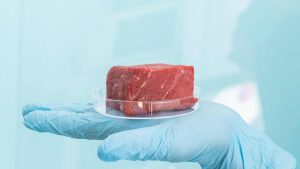
Despite their promising growth, lab grown meat startups in London face several hurdles. Regulatory approval is a major concern. While Singapore has become the first country to allow lab grown meat for sale, the UK is still developing its regulatory framework through the Food Standards Agency (FSA).
Another significant barrier is cost. Producing lab grown meat at scale remains expensive due to the complex infrastructure, expensive growth media, and technical expertise required. Public perception is another challenge many consumers remain uncertain about consuming meat created in a lab, although acceptance is slowly rising.
How Is Lab Grown Meat Positioned Within London’s Green Economy?

London has ambitious environmental targets, including achieving net zero emissions by 2030. Lab grown meat aligns perfectly with these goals by providing a low-carbon alternative to conventional meat production.
Many lab grown meat companies in London are working closely with policymakers and environmental organisations to promote circular economy practices. The city’s green economy also supports clean energy, sustainable farming, and eco-friendly food innovations, all of which complement the cultured meat movement.
How Are Investors Fueling the Lab Grown Meat Sector in the UK?
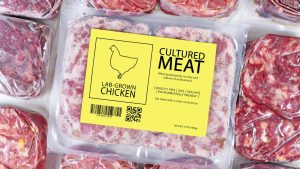
The investment landscape in London is fertile for food tech. Lab grown meat startups have attracted millions in venture capital funding from both domestic and international investors. Firms such as Agronomics, Blue Horizon, and CPT Capital have shown particular interest in scalable meat alternatives.
Government grants and university spin-outs are also helping these companies grow. The UK Government’s interest in food security and innovation funding creates favourable conditions for these companies to innovate and expand.
What Does the Future Hold for Lab Grown Meat in London?

The trajectory of lab grown meat companies in London looks promising. Industry experts predict that cultured meat will enter commercial markets by 2026–2028, with supermarkets and high-end restaurants introducing lab grown options.
As research and development improve and costs decrease, we can expect broader adoption across foodservice providers and retailers. Consumer awareness campaigns, taste testing events, and media coverage will also play a role in building trust and familiarity.
How Can Londoners Support the Growth of Cultivated Meat?

Support from local consumers will be essential to the growth of this emerging sector. Londoners can begin by following the progress of these companies, engaging with public tasting events, and supporting sustainable initiatives at local markets and restaurants.
Individuals can also invest in ethical food funds, share awareness through social media, and advocate for progressive food policies. Every small action helps move cultured meat from the lab to the plate.
Conclusion
London’s growing network of lab grown meat companies suggests that the city is positioning itself as a global leader in food innovation. From ethical considerations to climate goals, the case for cultured meat is stronger than ever and with supportive policy and public interest, London could very well lead the clean meat revolution for the rest of the world to follow.
FAQs About Lab Grown Meat Companies in London
What is the difference between lab grown and plant-based meat?
Lab grown meat is made from real animal cells, while plant-based meat is made entirely from non-animal ingredients. The former replicates actual meat, while the latter mimics its taste and texture.
Is lab grown meat legal to sell in the UK?
As of now, lab grown meat is not yet approved for commercial sale in the UK, but companies are in discussions with the Food Standards Agency and approvals may happen within the next few years.
Are lab grown meat companies in London exporting their products?
Most are in R&D or trial stages, but some have partnerships and pilot projects with international food chains and research labs.
How safe is lab grown meat to eat?
Cultured meat is considered safe when produced under regulated conditions. Since it’s grown in sterile labs, the risk of contamination is significantly reduced.
Will lab grown meat be affordable for the average consumer?
Currently, production is expensive, but costs are expected to drop as technologies scale. Within 5–10 years, prices may rival traditional meat.
Can lab grown meat companies help reduce global hunger?
Potentially yes, since it allows for decentralised production with fewer resources. However, affordability and infrastructure need to improve globally.
What role do universities in London play in this industry?
Universities provide research, talent, and lab space. Many startups began as academic projects before becoming full-fledged businesses.
